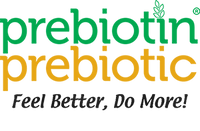
by Dr. Frank Jackson
Prebiotin Academy
Medical Concerns, Scientific Research and Diets
Leaky Gut Syndrome
The Facts
Leaky Gut Syndrome is sometimes called increased intestinal permeability, and it is a proposed medical condition, meaning scientists and doctors have been researching this set of symptoms and have been considering making it an official diagnosis. There are also many medical research studies about the condition.
Leaky gut syndrome affects the lining of the intestine wall. In a healthy person, the intestine wall keeps larger molecules from getting into the blood but lets nutrients through. In someone with increased intestinal permeability, on the other hand, the wall or lining is damaged or inflamed. This means germs, toxins, food particles and other substances get into the bloodstream when they shouldn’t. In some cases, this can lead to inflammation and can make patients quite ill, leading to everything from migraines to bloating and pain. Some doctors believe that leaky gut syndrome may be part of the reason behind Celiac Disease and Crohn’s Disease.
Leaky Gut Symptoms
The symptoms of leaky gut syndrome vary widely. Patients may experience:
- Bloating
- Cramps and pain
- Gas
- Joint pain
- Rash
- Migraines
- Chronic fatigue
- Rheumatoid arthritis
- Asthma
- Autoimmune disorders
- Food sensitivities
One reason why the symptoms of a leaky gut are so varied is because of how the intestine works. Since a leaky gut lets toxins, foods and other particles into a bloodstream and since the blood then carries them to different parts of the body, the results of the same problem can be very different.
Depending on the patient’s body, the types of toxins getting through and the affected parts of the body, the symptoms can vary greatly. When the intestine doesn’t do its job of keeping toxins and food particles out, the body can react with inflammation and with immune problems. Again, this can create different symptoms in different people.
Leaky Gut Causes
Scientists have suggested that taking antibiotics or painkillers can harm the lining of the intestine, making it more porous. A poor diet – especially a high-fat diet — is also said to contribute to the weakening of the intestinal lining. Both a poor diet and some medications can cause inflammation of the colon or intestine, which can cause cells in the lining to stretch out and become detached, leading to leaky gut.
Picture a soft, stretchy net around a balloon. When the balloon is deflated, the holes of the net are tiny and would only allow something small through. But when the balloon is inflated, the holes in the net grow until they let even large objects through. This is what some doctors think happens when the colon or intestinal lining becomes inflamed or damaged.
Leaky Gut Diagnosis
Doctors may base their diagnosis on the symptoms a patient reports. Doctors might also conduct tests to see how well the intestine functions. This test involves having a patient drink a mixture with both big and small sugar molecules and then testing the patient’s urine to see how well the intestines are blocking things and how well they’re absorbing nutrients.
Leaky Gut Treatment
Since the symptoms of leaky gut syndrome vary so widely and since scientists are still studying the disease, there is no firm suggested course of treatment. Many doctors recommend lifestyle changes – especially an improved diet and stress reduction – to help reduce the symptoms that patients may face. A better diet and stress relief can also help reduce the inflammation that both causes leaky gut and results from it. If there is a condition related to the leaky gut, such as Celiac Disease, treating that condition can help provide some relief.
Improving intestinal health with diet may be one solution, but intestinal health can also be supported with prebiotics. Prebiotics are a fiber that nourishes good gut bacteria. With a proper environment, good gut bacteria can thrive, which can help support intestinal health and overall immunity. To learn more about the benefits of our Prebiotin prebiotic supplements, please visit the Product Overview page or contact our team today.
Explore More
Medical Concerns, Scientific Research and Diets
-
Antibiotics and the Microbiome
-
C. Difficile
-
Calcium and Bone Density
-
Cancer
-
Celiac Disease and Gluten Intolerance
-
Children and Prebiotics
-
Colon Gas and Flatus
-
Colon Polyps and Cancer
-
Constipation
-
Crohn’s Disease
-
Diabetes Type 2
-
Diarrhea
-
Diverticulosis
-
Dysbiosis
-
End Stage Kidney Disease/Dialysis
-
Fatty Liver/Steatohepatitis
-
Fissure, Fistula and Abscess
-
Gut-Brain Connection
-
Heart and Cardiovascular
-
Hemorrhoids
-
High Fiber Diet
-
Immunity
-
Inflammatory Bowel Disease
-
Irritable Bowel Syndrome
-
Leaky Gut Syndrome
-
Low Fat Diet
-
Low Fiber Diet
-
Obesity and Weight Management
-
Toxins in the Colon
-
Ulcerative Colitis





